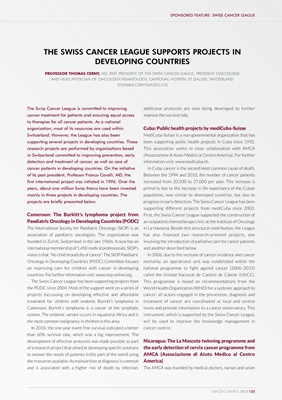
SPONSORED FEATURE: SWISS CANCER LEAGUE
THE SWISS CANCER LEAGUE SUPPORTS PROJECTS IN
DEVELOPING COUNTRIES
PROFESSOR THOMAS CERNY, MD, PAST PRESIDENT OF THE SWISS CANCER LEAGUE, PRESIDENT ONCOSUISSE
AND HEAD PHYSICIAN OF ONCOLOGY/HEMATOLOGY, CANTONAL HOSPITAL ST GALLEN, SWITZERLAND
(THOMAS.CERNY@KSSG.CH)
The Swiss Cancer League is committed to improving additional protocols are now being developed to further
cancer treatment for patients and ensuring equal access improve the survival rate.
to therapies for all cancer patients. As a national
organization, most of its resources are used within Cuba: Public health projects by mediCuba-Suisse
Switzerland. However, the League has also been MediCuba-Suisse is a non-governmental organization that has
supporting several projects in developing countries. These been supporting public health projects in Cuba since 1992.
research projects are performed by organizations based This association works in close collaboration with AMCA
in Switzerland committed to improving prevention, early (Associazione di Aiuto Medico al Centro America). For further
detection and treatment of cancer, as well as care of information visit: www.medicuba.ch.
cancer patients in developing countries. On the initiative In Cuba, cancer is the second most common cause of death.
of its past president, Professor Franco Cavalli, MD, the Between the 1994 and 2010, the number of cancer patients
first international project was initiated in 1996. Over the increased from 20,500 to 27,000 per year. This increase is
years, about one million Swiss francs have been invested primarily due to the increase in life expectancy of the Cuban
mainly in three projects in developing countries. The population, now similar to developed countries, but also to
projects are briefly presented below. progress in early detection. The Swiss Cancer League has been
supporting different projects from mediCuba since 2002.
Cameroon: The Burkitt’s lymphoma project from First, the Swiss Cancer League supported the construction of
Paediatric Oncology in Developing Countries (PODC) an outpatient chemotherapy clinic at the Institute of Oncology
The International Society for Paediatric Oncology (SIOP) is an in La Havanna. Beside this structural contribution, the League
association of paediatric oncologists. The organization was has also financed two research-oriented projects, one
founded in Zurich, Switzerland, in the late 1960s. It now has an involving the introduction of palliative care for cancer patients
international membership of 1,450 medical professionals. SIOP’s and another described below.
vision is that “No child should die of cancer”. The SIOP Paediatric In 2006, due to the increase of cancer incidence and cancer
Oncology in Developing Countries (PODC) Committee focuses mortality, an operational unit was established within the
on improving care for children with cancer in developing national programme to fight against cancer (2006–2015)
countries. For further information visit: www.siop-online.org. called the Unidad Nacional de Control de Cáncer (UNCC).
The Swiss Cancer League has been supporting projects from This programme is based on recommendations from the
the PODC since 2004. Most of the support went on a series of World Health Organization (WHO) for a systemic approach to
projects foccussing on developing effective and affordable cancer: all actors engaged in the prevention, diagnosis and
treatment for children with endemic Burkitt’s lymphoma in treatment of cancer are coordinated at local and central
Cameroon. Burkitt’s lymphoma is a cancer of the lymphatic levels and provide information to a cancer observatory. This
system. The endemic variant occurs in equatorial Africa and is instrument, which is supported by the Swiss Cancer League,
the most common malignancy in children in this area. will be used to improve the knowledge management in
In 2010, the one-year event free survival indicated a better cancer control.
than 60% survival rate, which was a big improvement. The
development of effective protocols was made possible as part Nicaragua: The La Mascota twinning programme and
of a research project that aimed at developing specific solutions the early detection of cervix cancer programme from
to answer the needs of patients in this part of the world using AMCA (Associazione di Aiuto Medico al Centro
the resources available. As malnutrition at diagnosis is common America)
and is associated with a higher risk of death by infection, The AMCA was founded by medical doctors, nurses and union
CANCER CONTROL 2013 133